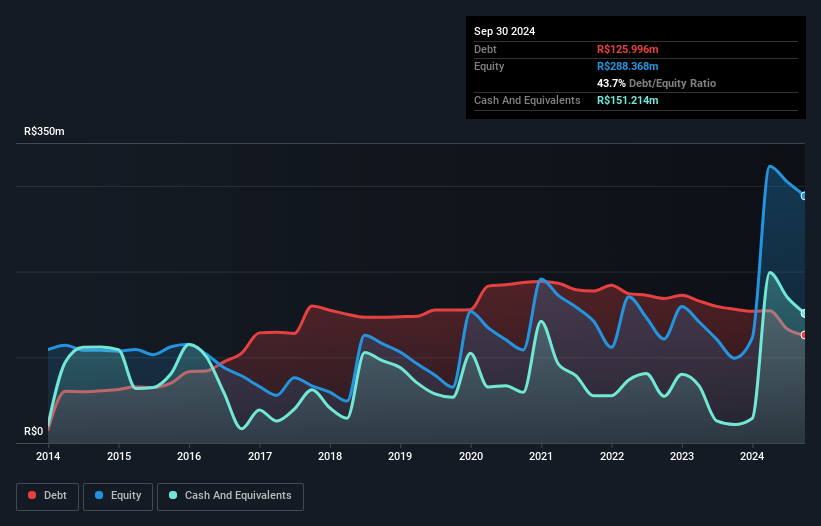
Howard Marks put it nicely when he said that, rather than worrying about share price volatility, 'The possibility of permanent loss is the risk I worry about... and every practical investor I know worries about.' It's only natural to consider a company's balance sheet when you examine how risky it is, since debt is often involved when a business collapses. We note that Biomm S.A. (BVMF:BIOM3) does have debt on its balance sheet. But the more important question is: how much risk is that debt creating?
Why Does Debt Bring Risk?
Generally speaking, debt only becomes a real problem when a company can't easily pay it off, either by raising capital or with its own cash flow. In the worst case scenario, a company can go bankrupt if it cannot pay its creditors. However, a more frequent (but still costly) occurrence is where a company must issue shares at bargain-basement prices, permanently diluting shareholders, just to shore up its balance sheet. Having said that, the most common situation is where a company manages its debt reasonably well - and to its own advantage. When we think about a company's use of debt, we first look at cash and debt together.
View our latest analysis for Biomm
What Is Biomm's Debt?
You can click the graphic below for the historical numbers, but it shows that Biomm had R$126.0m of debt in September 2024, down from R$156.0m, one year before. However, its balance sheet shows it holds R$151.2m in cash, so it actually has R$25.2m net cash.

How Healthy Is Biomm's Balance Sheet?
We can see from the most recent balance sheet that Biomm had liabilities of R$79.9m falling due within a year, and liabilities of R$118.2m due beyond that. Offsetting this, it had R$151.2m in cash and R$36.4m in receivables that were due within 12 months. So its liabilities total R$10.4m more than the combination of its cash and short-term receivables.
Having regard to Biomm's size, it seems that its liquid assets are well balanced with its total liabilities. So it's very unlikely that the R$1.05b company is short on cash, but still worth keeping an eye on the balance sheet. Despite its noteworthy liabilities, Biomm boasts net cash, so it's fair to say it does not have a heavy debt load! When analysing debt levels, the balance sheet is the obvious place to start. But you can't view debt in total isolation; since Biomm will need earnings to service that debt. So when considering debt, it's definitely worth looking at the earnings trend. Click here for an interactive snapshot.
In the last year Biomm's revenue was pretty flat, and it made a negative EBIT. While that hardly impresses, its not too bad either.
So How Risky Is Biomm?
We have no doubt that loss making companies are, in general, riskier than profitable ones. And the fact is that over the last twelve months Biomm lost money at the earnings before interest and tax (EBIT) line. Indeed, in that time it burnt through R$110m of cash and made a loss of R$73m. But at least it has R$25.2m on the balance sheet to spend on growth, near-term. Overall, we'd say the stock is a bit risky, and we're usually very cautious until we see positive free cash flow. When analysing debt levels, the balance sheet is the obvious place to start. However, not all investment risk resides within the balance sheet - far from it. To that end, you should learn about the 3 warning signs we've spotted with Biomm (including 2 which can't be ignored) .
At the end of the day, it's often better to focus on companies that are free from net debt. You can access our special list of such companies (all with a track record of profit growth). It's free.
Valuation is complex, but we're here to simplify it.
Discover if Biomm might be undervalued or overvalued with our detailed analysis, featuring fair value estimates, potential risks, dividends, insider trades, and its financial condition.
Access Free AnalysisHave feedback on this article? Concerned about the content? Get in touch with us directly. Alternatively, email editorial-team (at) simplywallst.com.
This article by Simply Wall St is general in nature. We provide commentary based on historical data and analyst forecasts only using an unbiased methodology and our articles are not intended to be financial advice. It does not constitute a recommendation to buy or sell any stock, and does not take account of your objectives, or your financial situation. We aim to bring you long-term focused analysis driven by fundamental data. Note that our analysis may not factor in the latest price-sensitive company announcements or qualitative material. Simply Wall St has no position in any stocks mentioned.
About BOVESPA:BIOM3
Flawless balance sheet low.
Market Insights
Community Narratives



